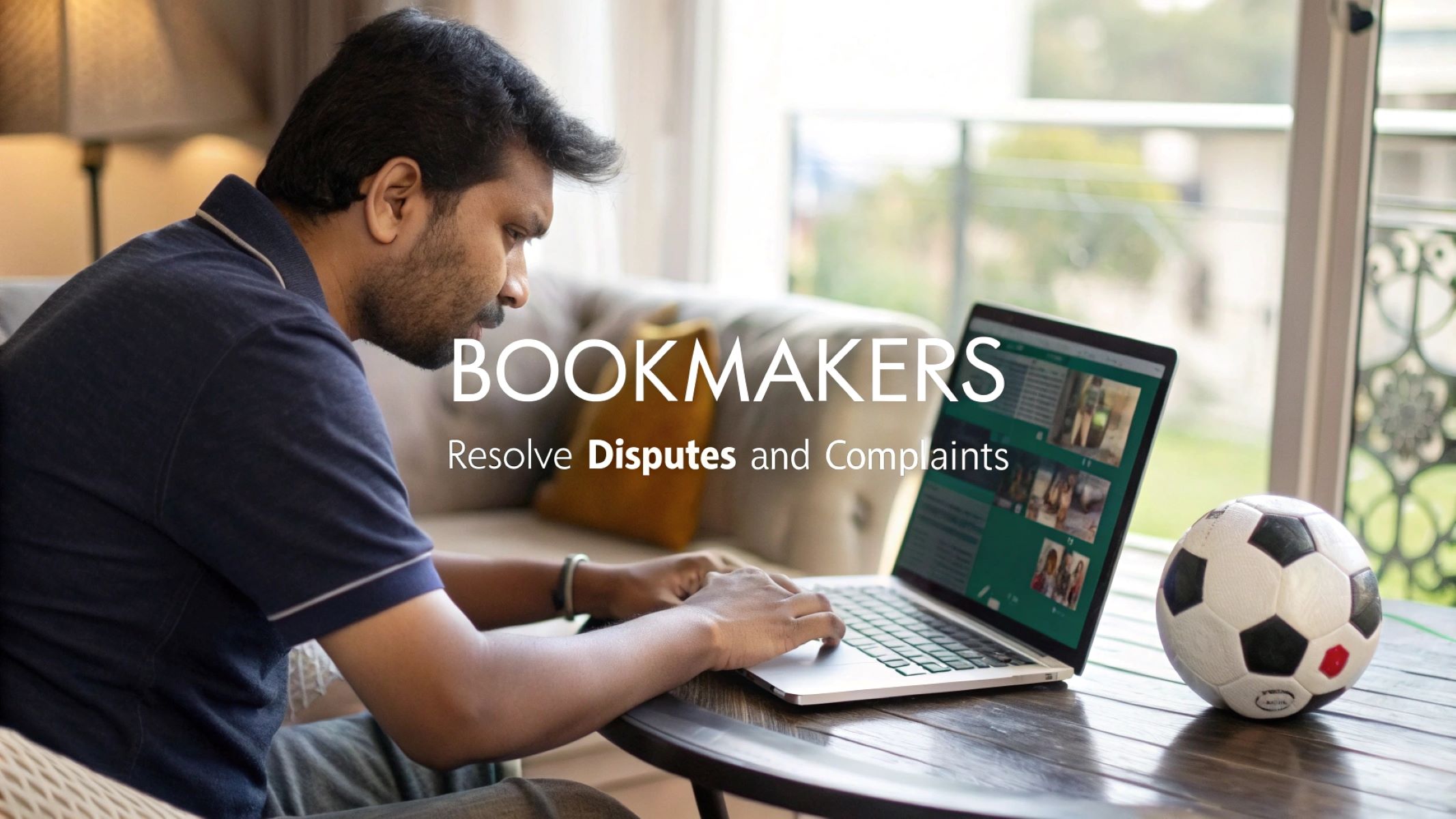Online betting in India has seen a massive boom over the past few years, but with great popularity comes a fair share of problems. One of the biggest concerns for punters is: What happens when something goes wrong? Whether it’s a delayed withdrawal or a suspended account, knowing how Indian bookmakers handle disputes and complaints is essential.
Indian Bookmakers
Indian bookmakers are entities — either individuals or companies — that offer betting services on sports, games, and events. They act as intermediaries between the bettors and the outcomes they wager on. In India, the most popular betting events include cricket matches (especially the IPL), football leagues, and online casino games like Teen Patti and Andar Bahar. Many of these bookmakers operate online platforms that are accessible via websites and mobile apps, providing convenient features such as live betting, quick deposits, and a variety of bet types. Some bookmakers are based locally but many are offshore entities targeting the Indian market with INR payment options, Hindi-language support, and tailored promotions.
Legal Status and Regulation in India
The legal framework surrounding gambling in India is complex and fragmented. India does not have a single, unified national law that regulates all gambling and betting activities. Instead, each state has the authority to make its own rules. For example, Sikkim and Goa have legalized and regulate certain forms of gambling, including online betting and casinos, while other states have strict prohibitions. This state-level control results in a highly inconsistent legal landscape where what’s legal in one region could be illegal in another.
Online betting, especially via international platforms, exists in a legal grey area. Most of the well-known Indian-facing bookmakers are registered and regulated overseas, making them technically outside Indian jurisdiction. While there are no explicit laws banning Indian residents from using such sites, users do not have strong legal protections if disputes arise. Furthermore, India’s Public Gambling Act of 1867 predates the internet and is largely outdated, offering little clarity on online betting. This regulatory gap means Indian bettors often rely on the bookmaker’s internal policies and international licensing authorities for dispute resolution.
Online vs Offline Bookmakers
Offline bookmakers are traditional agents or individuals who accept bets in person. These bookies typically operate in informal settings, often through a network of local agents or even underground markets. While they may offer a personal relationship and quick cash-based betting, there is almost no regulation or accountability in these setups. If a dispute arises — like not being paid after winning a bet — there’s little recourse, and the bettor is at the mercy of the agent. The risk is higher, and the betting experience is less transparent.
In contrast, online bookmakers have revolutionized the betting landscape in India. These platforms provide instant access to a wide range of markets, real-time odds, and features like live streaming and in-play betting. Online bookmakers offer customer support, automated systems for bet tracking, and digital proof of transactions, making the overall experience more secure. However, they also come with their own set of challenges — particularly around delayed withdrawals, technical glitches, and KYC verification issues. Resolving disputes online can be slower and less personal than dealing with a local bookie, especially when customer support is unresponsive or based in another country.
Common Types of Disputes in Betting
Disputes with Indian bookmakers are more common than many realize, especially among first-time or inexperienced bettors. These problems can arise from miscommunication, technical failures, or even intentional fraud by shady operators. Understanding the types of disputes that commonly occur can help users be more prepared and take precautions.
Here are the most frequent disputes faced by Indian users:
- Payment-related issues: The most common complaint. This includes situations where withdrawals are delayed without explanation or rejected without a clear reason. Sometimes the bookmaker may claim verification is pending, or impose hidden withdrawal limits.
- Account bans or suspensions: Often happen without warning, especially after big wins. The bookmaker might cite suspicious activity, multiple accounts, or incomplete KYC as reasons.
- Bet settlement errors: These occur when a winning bet is wrongly marked as a loss, or the odds used to calculate the payout are incorrect. Such issues usually stem from human error or backend system glitches.
- Technical glitches: These include app crashes, frozen screens, or errors during live betting sessions. A glitch during a crucial moment can lead to a lost bet or incorrect settlement, causing significant frustration.
Being aware of these disputes helps bettors know what red flags to watch for and how to respond swiftly when problems occur.
Initial Steps to Resolve a Dispute
Disputes are frustrating, but the way you handle them can make a big difference in how quickly they’re resolved. The first step is to remain calm and professional. Overreacting or using aggressive language can lead to your complaint being ignored. It’s important to follow a structured approach and give the bookmaker a fair chance to correct the issue.
Here are the key steps every Indian bettor should take when facing a problem:
- Read the Terms & Conditions: Most issues arise because users didn’t understand the rules. Whether it’s a bonus requirement or withdrawal limit, everything is usually mentioned in the T&Cs.
- Gather Evidence: Take screenshots of your bets, payment receipts, error messages, and all relevant communication. This documentation is vital for proving your case.
- Reach Out to Support: Use the bookmaker’s official customer support channel. Be polite and explain your issue clearly. Include your user ID, date/time of the issue, and attach supporting evidence.
Following these steps improves your chances of a faster and more favorable resolution. If the issue remains unresolved, you can then consider escalation.
Customer Support Channels
Customer support is often the first line of defense in any betting dispute. Reputable bookmakers offer multiple communication channels to ensure users get help quickly. The quality of support can vary widely, depending on the platform, time of day, and language availability. Generally, large betting companies have more responsive teams than smaller, lesser-known ones.
Here are the most commonly available support channels:
- Live Chat: This is typically the fastest and most accessible option. It allows for real-time conversation and is often available 24/7 on top betting platforms.
- Email: Suitable for more complex issues or when you need to send documents like KYC or transaction screenshots. It’s slower than live chat but more formal and traceable.
- Phone Support: Less common, but some large bookmakers provide a helpline for urgent matters. However, phone lines may only be open during business hours and might not support regional Indian languages.
- In-app Support: Some mobile apps include integrated support tools such as AI-powered chatbots or direct messaging systems that let you track the status of your complaint.
Always document your communication and note down support ticket IDs for reference in case you need to escalate the matter later.
Role of KYC (Know Your Customer)
KYC, or Know Your Customer, isn’t just a regulatory checkbox — it’s a core security step that betting platforms use to verify who you really are. It helps ensure that the person depositing, betting, and withdrawing funds is indeed the rightful account owner. Without this process, bookmakers would be exposed to fraud, identity theft, and money laundering. For users, it creates a layer of trust, giving reassurance that the platform isn’t just taking your money and running. Especially in India, where many betting platforms operate from overseas, KYC builds a bridge of legitimacy between the user and the bookmaker.
Completing your KYC helps speed up withdrawals, prevents account restrictions, and makes dispute resolution faster in case of any problem. It’s a crucial step before placing large bets or expecting fast payouts. When your identity is verified, your account becomes “trusted” — meaning you’re less likely to face payment holds or random security checks. Bottom line? If you skip KYC, you’re gambling with your own access to your winnings, no matter how well you bet.
Common KYC Issues
Despite its importance, KYC doesn’t always go smoothly. Many users face frustrating delays or outright rejections when submitting documents. One of the most common problems is blurry or low-quality uploads — think dimly lit photos of IDs or cropped-out corners. If the bookmaker’s team can’t clearly read the details, they’ll reject it instantly. Another frequent issue is when the name on your betting account doesn’t exactly match your bank details. For instance, if your profile says “Rahul Kumar” but your bank lists “R. Kumar,” it could raise red flags and block withdrawals.
Expired documents are another hurdle — users often upload IDs or utility bills that are no longer valid. A driving license that expired last month or a bill that’s three months old might not meet the platform’s criteria. There’s also the issue of incomplete addresses or documents in regional languages that aren’t accepted. These all result in a back-and-forth that delays your access to funds. To avoid all this, it’s best to upload high-resolution images, double-check name and date accuracy, and use only active, official documents.
| Issue | Description | Consequence | How to Fix It |
| Blurry or cropped documents | Low-quality scans/photos of ID or proof of address | Rejection or delay in verification | Re-upload clear, well-lit, full-frame documents |
| Name mismatch | Name on account doesn’t match bank or ID records | Withdrawal rejections | Update account info or provide matching documents |
| Expired ID | Uploaded document is no longer valid (e.g., old passport) | KYC fails; withdrawal put on hold | Submit a valid, up-to-date ID |
| Incomplete address proof | Utility bill doesn’t show full address or is too old | Verification rejected | Upload a recent, complete bill (within last 2 months) |
Real Case Studies and Resolutions
Case 1: Withdrawal Delayed by 14 Days
In this real-life scenario, an Indian bettor using an international bookmaker requested a withdrawal after winning a large amount during an IPL cricket match. Despite completing KYC weeks earlier, the user noticed that the withdrawal status remained “Pending” for over 14 days. Support provided vague answers like “under processing” without a timeline or reason. Feeling stuck, the bettor turned to Reddit to publicly share his issue, including screenshots and transaction IDs. To add more pressure, he tagged the bookmaker’s official Twitter support handle.
The result? Within 48 hours of the post going viral, the issue was resolved. A customer support representative contacted the user directly and processed the withdrawal immediately, blaming a “technical backlog.” This case shows how public exposure on social platforms can sometimes be more effective than traditional support channels, especially when dealing with international bookmakers who are wary of negative publicity.
Case 2: Suspended Account Post Big Win
In another case, a user hit a major jackpot on a slot game and shortly after noticed his account was suspended. When he contacted customer service, they responded by asking for additional KYC documents — this time, beyond the original ones already submitted. The user was asked to provide a selfie holding the ID, a bank account statement, and even proof of source of funds. Feeling overwhelmed and sensing stalling tactics, the user escalated the issue to AskGamblers, a third-party mediation platform that handles disputes with online casinos and bookmakers.
AskGamblers intervened and contacted the bookmaker on behalf of the user. Within five days, the bookmaker lifted the suspension, citing a misunderstanding in document verification. The user received full access to his account and his winnings. This case illustrates the importance of knowing where to escalate your complaint and how external mediators can tip the balance in your favor when internal support falls short.




